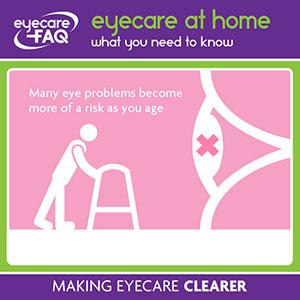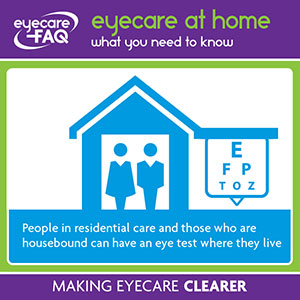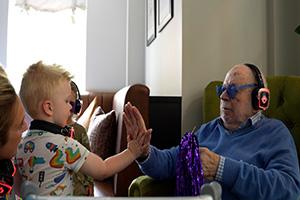Eyecare – we care!
If you are looking after elderly people in residential care, they may need assistance with mobility,  self care, and medication, but is anyone helping them take care of their eyes? Older people are most at risk of eye disease, and those in residential care can easily miss out on the important routine sight test which checks on both the health of their eyes and their vision. Read on to find out how you can easily ensure your residents’ eyes are just as well looked after as their other needs.
self care, and medication, but is anyone helping them take care of their eyes? Older people are most at risk of eye disease, and those in residential care can easily miss out on the important routine sight test which checks on both the health of their eyes and their vision. Read on to find out how you can easily ensure your residents’ eyes are just as well looked after as their other needs.
Max Halford FBDO is Clinical Lead at the Association of British Dispensing Opticians. He explains, “Eyes, like any part of the body, change as we get older but poor eyesight isn’t something we should accept. People will need to use their glasses more. They may seek better lighting for small print as they get older. However if you notice that a resident is struggling with reading or looking at the television it can be a sign that their vision has changed. If someone you care for has lost interest in reading for example, a visit to your local optician’s practice is recommended.”
Everyone, however old, should have a sight test every two years, or more often if the optician recommends. You can also go back if you feel your eyes have changed in between tests. If you are concerned about how to get an elderly and frail person to the opticians, you will find that there are optical practices in most towns who provide a home visit or “domiciliary service”. Max Halford says, “If the person you are caring for is housebound the cost of this may well be covered by the NHS. If you are having difficulty locating an optician who provides this service look online for your Local Optical Committee and they will recommend opticians who specialise in care home visits.”
Opticians will visit whether a single person needs eyecare, or whether you have a number of residents in need of care. Max Halford says, “It is a good idea to get the optician to visit the care home first so you can discuss the best way they can come and look after your residents.”
Some people may prefer to stick with the optician they are used to: they or their family may be able to supply details. This provides the benefit of continuity of care. Max Halford says, “A visit to the resident’s own local opticians can be best as they will have the previous records. All optician’s practices have to comply with the Equality Act and welcome carers to come in and support patients whilst the eye test is being carried out”.
Make sure that the optician writes down their recommendation for the person so that this can be shared amongst all those who care for the person. The recommendation can be to update spectacles, and when they should be worn. Some people may need further tests at the hospital if they have signs of eye  disease and the optician can advise on this too.
disease and the optician can advise on this too.
It is important to ensure that people wear their specs as the optician advises. Max Halford says, “If you work in a care home, there is nothing worse than finding a pair of specs and realising you have no idea who they belong to!” To avoid this he suggests, “Take a photo of the resident in their new specs to add to their record. Pop the residents initials on the inside of one of the sides in indelible pen. And if a mix up has occurred, the optician will have a record of any specs they provided!”
Some people will have more than one pair of spectacles, and it can be difficult for the carer to know which specs they should wear when. Max Halford advises, “Nowadays most people get on well with varifocal or bifocal specs so one pair helps them see clearly at distance and close up. Some people prefer a separate pair of reading and distance glasses. If they do get muddled up the best way to check is to ask the resident in which pair they can see the television best- this should be the distance glasses.” You can also add “D” for distance or “N” for near in indelible pen to the side of the specs and the case they are stored in to help everyone know which pair is which.
Some of your residents may have uncomfortable eyes. Dry eye is a major problem for many older people and one study compared chronic dry eye discomfort to that of angina. Do talk to the optician about this as there are a number of ways to help people. Max Halford explains, “Most people with dry eyes do have lots of tears. Very often you will see them with very watery eyes, but the quality of the tears is not good enough and they aren’t lubricating the eyes properly. Your optician or local pharmacy will be able to recommend eye drops to be used on a regular basis throughout the day- possibly every couple of hours or more- check with the optician when they visit.”
There is lots more information about eyecare and older people on the Association of British Dispensing Optician’s website – or follow EyecareFAQ on Twitter or Facebook.






